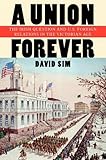A union forever : the Irish question and U.S. foreign relations in the Victorian age / David Sim.
Material type: TextSeries: United States in the worldPublisher: Ithaca : Cornell University Press, 2013Description: 1 online resource (279 pages) : illustrationsContent type:
TextSeries: United States in the worldPublisher: Ithaca : Cornell University Press, 2013Description: 1 online resource (279 pages) : illustrationsContent type: - text
- computer
- online resource
- 9780801469688 (e-book)
- Irish question
- United States -- Foreign relations -- Ireland
- Ireland -- Foreign relations -- United States
- United States -- Foreign relations -- Great Britain
- Great Britain -- Foreign relations -- United States
- United States -- Foreign relations -- 19th century
- Ireland -- Politics and government -- 19th century
- 327.730417/09034 23
- E183.8.I6 S56 2013
Includes bibliographical references and index.
Introduction : an Atlantic triangle -- Challenging the union : American repeal and US diplomacy -- Ireland is no longer a nation : the Irish famine and American diplomacy -- Filibusters and Fenians : contesting neutrality -- The Fenian Brotherhood, naturalisation, and expatriation : Irish-Americans and Anglo-American comity -- Toward home rule : from the Fenians to Parnell's ascendancy -- A search for order : the decline of the Irish question in American diplomacy -- Epilogue : rapprochement, Paris, and a free state.
"In the mid-nineteenth century the Irish question--the governance of the island of Ireland--demanded attention on both sides of the Atlantic. In A Union Forever, David Sim examines how Irish nationalists and their American sympathizers attempted to convince legislators and statesmen to use the burgeoning global influence of the United States to achieve Irish independence. Simultaneously, he tracks how American politicians used the Irish question as means of furthering their own diplomatic and political ends. Combining an innovative transnational methodology with attention to the complexities of American statecraft, Sim rewrites the diplomatic history of this neglected topic. He considers the impact that nonstate actors had on formal affairs between the United States and Britain, finding that not only did Irish nationalists fail to involve the United States in their cause but actually fostered an Anglo-American rapprochement in the final third of the nineteenth century. Their failures led them to seek out new means of promoting Irish self-determination, including an altogether more radical, revolutionary strategy that would alter the course of Irish and British history over the next century"-- Publisher's Web site.
Description based on print version record.
Electronic reproduction. Ann Arbor, MI : ProQuest, 2015. Available via World Wide Web. Access may be limited to ProQuest affiliated libraries.
There are no comments on this title.

